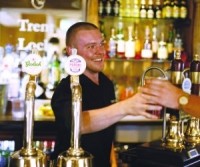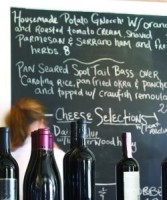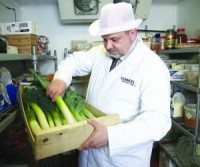Avoiding those banana skins: Running the perfect pub

Enthusiastic staff are key to success
David Hancock, editor of Alastair Sawday’s Pubs & Inns of England & Wales
“I think unenthusiastic staff is one of the biggest mistakes made. All customers should be welcomed with a warm smile, but I often
find the wrong staff are given breakfast duty, which requires ‘morning people’ with happy, smiling faces.
“Staff also need a can-do attitude and to remember that the customer is always right. If there is a problem with a meal or the bill, offer the customer a drink, sort the problem out positively and make sure that customer will return.
“Laminated menus indicate that they are rarely changed and long laminated menus beg the question — is everything freshly cooked? Chalkboard menus imply a kitchen using fresh produce and that dishes change daily.
"Seasonality is also important, so don’t serve asparagus in winter and only offer English strawberries in summer, for example. If you champion local farmers and artisan producers, shout about it on your menus.
“Another pub menu faux pas is overcharging. A £15.50 fish and chips will alienate customers and lead to an empty pub. It is essential to remember that a pub is a pub and not a restaurant and, as such, balance price and portion size.
"If dishes are too fancy and portions are small with a hefty price tag, they will be perceived as a special occasion restaurant. Equally, piled-high dishes overwhelm diners.
“The atmosphere of a pub is a key factor in the inspection process. First impressions count and I don’t like to see a scruffy entrance, dead flowers in tubs or window boxes, shabby garden furniture, or tables littered with lunchtime plates and full ashtrays. It shows the owner and staff don’t care.
"Inside, sticky tables, stained menus, loud music, smelly loos and unwelcoming staff are top of my observation list.”
Some things to avoid...
Alastair Scott, founder of Catton Consulting and former managing director of Mitchells & Butlers’ All Bar One
I love walking into pubs with high expectations and a sense of excitement about what I might find — but there are a number of things that make my eyes roll. Signals that will immediately disappoint me are:
- A lack of music — music creates atmosphere, warmth and a bit of noise so you don’t have to feel that you should whisper. A quiet pub is a no-no.
- No fire in winter — an unlit fire is a sign that the operator doesn’t care.
- Staff reading at the bar — if they carry on to finish their sentence that really grates on me.
- Staff ignoring you — when you walk in, staff should acknowledge you.
- Scruffy landlords — it often happens that a pub’s staff look great, but the licensee still feels able to wear what he or she wants. The landlord should be setting an example in every way.
- Lack of visible menus — if you sell food, you need to tell people about it.
- More staff than customers — it is clearly not good business, but happens all too frequently.
- Poorly laid-out kitchen — this can result in slow food delivery or high staff costs and money isn’t made. Kitchen layout is critical in this industry.
- Ticket management — a core skill but often not monitored. Do you know how many tickets you can do at the same time?
How to keep hold of your punters
Philip Davison, founder of consultancy Recipe4Success and former BII Licensee of the Year
“It is not your customer’s job to remember to visit your pub — it is your job to remind them and give them a reason to visit you.“In these tough competitive times, great food and service alone are not quite enough to keep tables as busy as operators would like.
"It is necessary to really know your clientele and keep in touch with them to lure them back. Many licensees spend small fortunes on getting new visitors through their doors, around six times more than keeping existing customers.
"But most of that money is wasted, because they allow those new people to walk out after the first visit, without attempting to attract them as a long-term regulars.
"Punters are the most important commodity in a pub and having a system, like a database, is vital.
“Potential customers live in a world of tempting offers and promotions so the question is how pubs can respond without watering down their quality of food and service or damaging their reputation.
“Building loyal relationships makes drinkers and diners feel special and keeping in touch is the most successful way to develop and increase your sales.
“Delight existing customers with an unexpected ‘thank-you’ card, personalised birthday card or personalised invitation — it will certainly attract more footfall and improve profit.”
Ignore guests at your peril
Alec Howard, managing director of Planet Food
“When I walk into a pub for the first time I look for signals that it is a place that is serious about food. That can come from the decor and ambience and visible food signals such as specials boards, menus or other PoS material.
“Nothing irritates
guests more than being ignored. Eye contact (and, of course, a smile), even when the team is too busy to serve you, is so important and costs nothing. Yet it is so often not employed.
“When it comes to pet hates regarding presentation, I hate overly complicated dishes with too many ingredients and too much garnishing. Chefs often give too much choice and mistake their own preferences for those of their guests. And I don’t like menus with chef-driven flowery language that means nothing to the guest — keep it simple but appealing.
“In terms of decor, nothing is more important than cleanliness and lights shouldn’t be too bright.
“To stand out from the competition, operators need to understand what their guests want and build a simple menu of great dishes with a couple of twists or additions that are relevant to the market.
“Always be famous for something. All operators and chefs need to do to please their guests is simple — ask them!
“The best advice I could give would be to try to make a guest’s day. There are plenty of low-cost things you can do to make their experience more memorable.”
Lean on an expert for health and safety help
Stuart Knill and Stephanie Collyer, health & safety managers at Venners
While being a multi-million pound trade with great rewards, the hospitality industry can also be a veritable minefield for those unwary of health and safety. Using an industry expert can pay dividends in being guided through the complex body of statutory regulations. It minimises the risks and saves the operator a lot of time and heartache.
Top tips for maintaining a healthy and safe working environment:
- Never ignore any directive, suggestion or recommendation from your local authority. If uncertain, seek clarification.
- Make sure that where items are dated and need renewing that you do so — eg, fire extinguisher maintenance, pest control, certification and fire risk assessments.
- Keep up with health, food and fire safety matters as your business changes, be they physical, menu or staff changes.
- Check that you have statutory items in date and in place, including health & safety policy, food safety controls, designated premises supervisor and other personal licence holders.
- Keep up to date with staff training and record what is done and who attended.
- Wherever possible, take a fresh look at your premises and try to put yourself “in your customers’ shoes” to see where improvements are needed/possible.
- Keep your site/s clean and tidy, taking care with all aspects of your business.
- Hold regular meetings with members of your team to enhance business and consider any issues.
Common mistakes:
- Lack or absence of staff training
- Fire exits not kept clear
- Staff wearing unsuitable footwear not fit for purpose
- Glasses used as ice scoops
- Little or no dating of foodstuffs
- Fridge and freezer temperatures not taken
- Spoons left in ready-made food mixtures
- Seals on fridges fractured or broken
- Babies’ high chairs not being properly cleaned
- Extraction systems not cleaned
- Chopping boards not replaced when heavily scored
- Lack of cleaning in nooks and crannies
- Correct H&S signage not displayed in bedrooms
- Dirty grooves in glass washers
Source: Venners
















